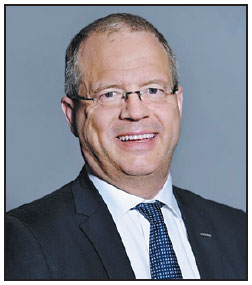Strengthening regional connectivity
Editor's Note: The Second Belt and Road Forum for International Cooperation was held in Beijing from April 25 to 27. China Daily interviewed top business executives from well-known multinational companies for their views and suggestions on the initiative.
Q1: What is your view of the Belt and Road Initiative proposed by China six years ago? Will the initiative be beneficial to your country or region?
Q2: Do you think the initiative will help fuel global economic growth and free trade and investment? Are there any new industries in your country or region made possible by the BRI?
Q3: How does the BRI benefit your business in China and worldwide? How does your company plan to further participate in the initiative?
Q4: What suggestions do you have for improving the implementation of the BRI?
Q5: Are there infrastructure projects that your country or region would not be able to implement without the BRI? Can you give examples of how these help the economy of your country or region?

Martin Lundstedt, president and CEO of Volvo Group
A1 Taking transport and infrastructure building and interconnectivity as a prioritized area, the BRI provides a blueprint for strengthening connectivity and boosting prosperity through regional cooperation. Over the past five years, China and other economies in the Belt and Road region have conducted effective cooperation and achieved great progress in this regard. For instance, last year, the China-Europe freight train, a crucial part of the BRI, launched a new route from the province of Dalarna in central Sweden, Volvo Group's home country, to East China's Ganzhou port, via Gothenburg.
A2 The BRI has been an important propeller for global free trade and international cooperation because it helps China, and other emerging economies along the route, to further integrate into the world economy. We also think that the initiative allows China to share its knowledge and experience in terms of economic development and business innovation. Take e-commerce as an example, a name card of China's innovation. In 2017, Swedish Prime Minister Stefan Lofven said during his China visit that e-commerce brings opportunities to Sweden and many Swedish brands entered China through the e-commerce platforms here.
A3 The BRI is closely related to the areas of transport and infrastructure building and connectivity in which the Volvo Group has total solutions and know-how. For instance, Volvo construction equipment products are widely used in infrastructure building and urban utility applications, while Volvo trucks can provide efficient and safe transport solutions for inter-regional trade and Volvo buses can help address the challenges of urban traffic congestion and rural area residents' commuting along the route. More importantly, we are working closely with Chinese engineering, procurement and construction (EPC) partners and support their goals of "going global".
A4 While the BRI has made remarkable progress, it still entails risks and challenges from various critical factors in those economies - geopolitics, cultural conflict, commercial risks, and trade and administrative barriers. First, the transparency and openness of strategic information needs to be increased by, for example, publishing lists of the BRI projects in a timely and complete manner, and opening financing to social and private capital. Second, all parties should work more closely to remove trade and administrative barriers to improve efficiency. In the logistics field, where Volvo Group operates, it may be worthwhile to promote unification of standards for freight vehicles, oil quality and emissions. Last, it is always crucial to take a sustainability approach to achieve balance and parallel progress in aspects of the economy, society and environment.
A5 In addition to the train route from central Sweden to China's Ganzhou port that I mentioned, Sweden and four other Nordic countries are all founding members of the Asia Infrastructure Investment Bank, which is a lead financing partner of the BRI.

Vaughn Barber, global chair of KPMG Global China Practice
A1 The BRI is a comprehensive and inclusive vision and action plan for addressing the development needs of emerging markets and developing countries. China's own experience shows that infrastructure development supports and leads to broad-based economic and social development. Similarly, the BRI is built on the premise that raising living standards and prosperity in, and strengthening connectivity with developing countries will be good for global economic growth because it will unlock new demand for goods and services.
A2 We are seeing opportunities for our Chinese and foreign clients in three key areas. First, the BRI has focused global attention on the question of how to attract private capital into infrastructure projects in developing and emerging markets. A second key area is for companies to expand to emerging markets where new demand is being created as a result of the economic benefits from improved policy, infrastructure, trade, financial, people and digital connectivity. A third key area is digital connectivity. In the same way that digitalization has become an important driver and enabler of transformation for companies operating in the Chinese market, we see a lot of potential for new technologies and business model innovations developed in China to have a positive impact on social and economic development in emerging markets.
A3 During the inaugural Belt and Road Forum for International Cooperation, we announced that KPMG has formed a KPMG Belt and Road Centre of Excellence. We will continue to mobilize expertise and resources from around the KPMG global network to support our clients in China and abroad to uncover and convert opportunities from the implementation of the BRI. To this end, a main area of focus will be helping leading foreign companies to identify new opportunities to work with leading Chinese companies in China, in their home markets and in third country markets.
A4 Given the relative lack of understanding about the opportunities for foreign companies in BRI projects, it is important to profile success cases to demonstrate the new business opportunities which can be achieved from international collaboration amid the BRI development. Developing and piloting new approaches to utilize private capital in international infrastructure projects in Belt and Road markets is another area that is ripe for international collaboration among governments, multilateral institutions, industry associations and businesses.
A5 To better participate in the BRI development and resolve problems, we will work with stakeholders in China and abroad to facilitate more sustainable, inclusive and commercially viable infrastructure projects that can attract private capital, deliver inclusive economic growth and provide opportunities for greater infrastructure trade and investment cooperation between Chinese and international companies.

Caroline Wu, managing director of Maersk China
A1 During the past years, we have been looking at how we can fit in with the BRI, not only by providing transport services, but also by acting as a partner and co-investor with Chinese companies in these developments. Fundamentally, because the investment in infrastructure will facilitate increased trade, providing more demand for our ships, terminals, trains and supply chain management systems - the BRI creates many benefits to all players in the shipping and logistics community, where Maersk operates.
A2 Maersk believes that the BRI, which has the overarching aim of increasing connectivity and promoting global trade, can contribute to further reduce trade costs and bring trade based prosperity to more markets. Global trade is the key to economic growth and prosperity. Using China as an example, we can see that investment in the construction of infrastructure has contributed significantly to trade and economic growth, and we believe that one of the key factors in China's trade-based economic growth in particular following China's accession to the World Trade Organization, was the ability to create the infrastructure that enabled fast and efficient transport to all corners of the globe at a competitive price.
A3 For example, Maersk's terminal arm APM Terminals formed a joint venture with China COSCO Shipping Ports and Qingdao Port International Development in Vado, Italy. The parties operate together in the reefer terminal in Vado, the largest refrigerated cargo facility on the Mediterranean Sea, and will develop and operate a new deep-water container terminal together in the same area. Maersk has been working for a long time with Chinese partners, also in other places, such as Belgium and Egypt.
Rail services are becoming increasingly important for the transportation of goods between China and Europe. Maersk launched an intercontinental rail product in 2014, providing an end-to-end bundle solution via Wuhan, Chongqing, Chengdu and Yiwu. And we also worked with local partners in Wuhan to tailor make the first block train from China to France in October 2017. Since 2018, Maersk has also extended weekly Maersk rail services from Xi'an in Northwest China to Europe.
A4 What we care about first and foremost is that the initiative is open, transparent and welcoming to all players. It should be done in a spirit of mutual collaboration to create prosperity for everyone involved.
A5 Today, approximately 4 percent of the cargo between China and northern Europe is moved by rail. Although it is still a relatively small contributor to global trade, we believe that there is a demand for this product and the intercontinental rail service is poised for growth. We foresee in coming years that we will continue to see a significant year-on-year growth in rail volumes to and from Europe. We believe the development of intercontinental rail would not grow that fast without the implementation of the BRI.

James Huang, general manager of Payoneer China
A1 The BRI has opened up a road of connectivity. It allows China and economies around the world to leverage their complementary advantages, integrate resources effectively, and achieve development. The research and development center of Payoneer is located in Israel, which is a country on the Belt and Road. In Israel, we have seen many BRI projects, and the country's advanced agricultural technology has also been introduced to China through the BRI.
A2 In the past six years since its implementation, the BRI has helped promote global infrastructure connectivity, facilitate free trade and investment, and safeguard the establishment of economic globalization and the multilateral trading regime. Taking cross-border e-commerce as an example, the BRI has promoted cooperation in building industrial parks and enhancing production capacity. Trade and communication with Africa and Southeast Asia have increased significantly; a number of free trade pilot zones and cross-border e-commerce experimental zones have been built, providing convenience for customs clearance and more favorable policies for the import and export of goods.
A3 In 2017, Payoneer was the exclusive partner and payment service provider of Chinese e-sellers for Joom, the Russian e-commerce platform, and helped hundreds of high-quality e-sellers from China get onto the platform. The products sold by these Chinese e-sellers were popular among Russian consumers. At that time, Chinese e-sellers were receiving more than 10,000 orders in a single day. Apart from the good quality and low price of Chinese goods, the great success of Chinese e-sellers in the Russian market was closely linked to the convenient customs clearance and favorable trade policies under the BRI.
A4 China's cross-border e-sellers are likely to encounter some difficulties in terms of infrastructure when entering some economies along the Belt and Road. Transportation and communication infrastructure in some countries still lag behind regions with dense populations, like those in Europe and Asia. Port cooperation mechanisms are not in place, the transit of goods is not sufficiently facilitated and logistics costs are relatively high, making the circulation of goods and services more difficult. In addition, Chinese cross-border e-commerce sellers often encounter seasonal problems of working capital and overseas payment difficulties in new markets. The types and scope of financial products for Chinese businesses to go global are still limited for the time being.
A5 With the in-depth implementation of the BRI, Chinese e-sellers have chosen to expand their business in markets along the Belt and Road. But many e-sellers find it confusing when it comes to choosing a suitable platform, understanding local markets and policies of the platform, or getting onboard the platform. Having noticed the difficulties faced by e-sellers, Payoneer has provided a green channel to Chinese cross-border e-sellers in China since 2015.

Zhang Zhiqiang, managing director of ABB China
A1 The BRI creates new opportunities for cooperation between Chinese and foreign enterprises. In the wake of China's enterprises to accelerate the pace of "going out" and actively participate in the overseas project construction, ABB has provided more than 400 Chinese enterprises with consultancy, design, engineering and various services in response to the BRI in more than 70 countries and regions around the world. The BRI has injected new momentum for China and the global economy and closed the gap between the East and the West, opening new space and opportunities for global collaboration.
A2 We are encouraged by China's efforts to open wider to the outside world and we are confident in China's bright future. As a pioneer of digital technologies, we introduced ABB Ability digital solutions and services to the Chinese market in 2017, and have helped customers in utilities, industry, transport and infrastructure to capitalize on the value of big data to strengthen productivity, groundbreaking innovation and core competitiveness. Digital means, together with the momentum of the BRI, are expected to help customers increase efficiency, improve energy efficiency and raise global competence.
A3 ABB's development has benefited from the trend of globalization and the rapid development of China's economy and trade. In 2018, ABB was awarded a major project by Ittihad International Investment Group through China Light International Engineering Co Ltd, the engineering, procurement and construction contractor. ABB provides the ABB Ability collaborative production management system to the project, realizing integration from factory to enterprise level and enabling analysis and support to management for more efficient production, lower cost of storage and personnel, improved maintenance and improved profitability.
A4 Nowadays, the BRI has come to maturity with many Chinese enterprises going abroad in the way of initial investment evolving into deep cooperation. As national and regional design and industry standards differ in different countries, ABB can help Chinese enterprises better control risks with rich technological expertise. Besides, ABB can provide localized consulting, design, engineering, manufacturing and services for Chinese companies' overseas EPC projects, helping them reduce project costs and engineering risks, as well as enhancing competitiveness in the global market.
A5 With a focus on energy infrastructure, industry and transport and infrastructure, the BRI will drive growth and trade and help improve the infrastructure of economies related to its routes. A considerable number of economies involved in the BRI are less developed in fields such as utilities, industry, transportation and infrastructure. They urgently need to improve productivity and energy efficiency in the fields of power grid, mining, steel, nonferrous metal, oil and gas industries.

Roman Wojdyla, general manager of Home Credit Consumer Finance Co Ltd
A1 We have witnessed the tremendous achievements since the initiative has been proposed, and we believe that the international community will continue to support and actively participate in this great action. For foreign enterprises from areas and regions related to the BRI, the initiative is the biggest attraction in itself. As the initiative is being developed, there will be more and more opportunities in terms of market, investment, green growth and external cooperation. And the economies related to the BRI will benefit from it.
A2 Definitely yes! For global economic growth as well as free trade and investment promotion, the BRI will generate win-win results of globalization. The initiative brings not only the development of free trade for many countries, but also cooperation in many fields, such as infrastructure, finance, technology and culture exchange.
The BRI also helps to continuously lift the restrictions on foreign investment in China, especially the market access threshold in industries and the limitation on the proportion of foreign investment in some sectors, which allows more space for the development of foreign investment in China. In addition, the legal environment has become more standardized, transparent and fair, which provides more convenience and reliable conditions for foreign investors in China.
A3 In recent years, Home Credit has reached a strategic partnership with OPPO and other Chinese smartphone brands and digital product producers, providing them with consumer finance solutions, which cover the entire process of loans, consumption, payment and credit system construction, to help them rapidly exploit the markets that the BRI targets and to drive purchases of "Made in China" products in multiple Southeast Asian markets. The collaboration has yielded pleasant results.

A4 China boasts a world-class business environment, and the deepened reform and opening-up of the financial industry will attract more high-quality foreign investment to China. In this case, foreign financial firms, together with Chinese enterprises, can provide inclusive financial services for Chinese consumers, support to promote consumption upgrade, and make the Chinese market more energetic.
A5 Located in Europe, the Czech Republic is an important country related to the BRI. As one of the representative enterprises of the Czech Republic, Home Credit has always been engaged with the Belt and Road Initiative. With the vision of building financial inclusiveness, Home Credit has also been trying to make more "Made in China" brands known by the economies involved in the BRI. In the future, Home Credit will continue to join hands with Chinese enterprises to continuously bring quality products and services to more consumers.
(China Daily 05/08/2019 page9)


















